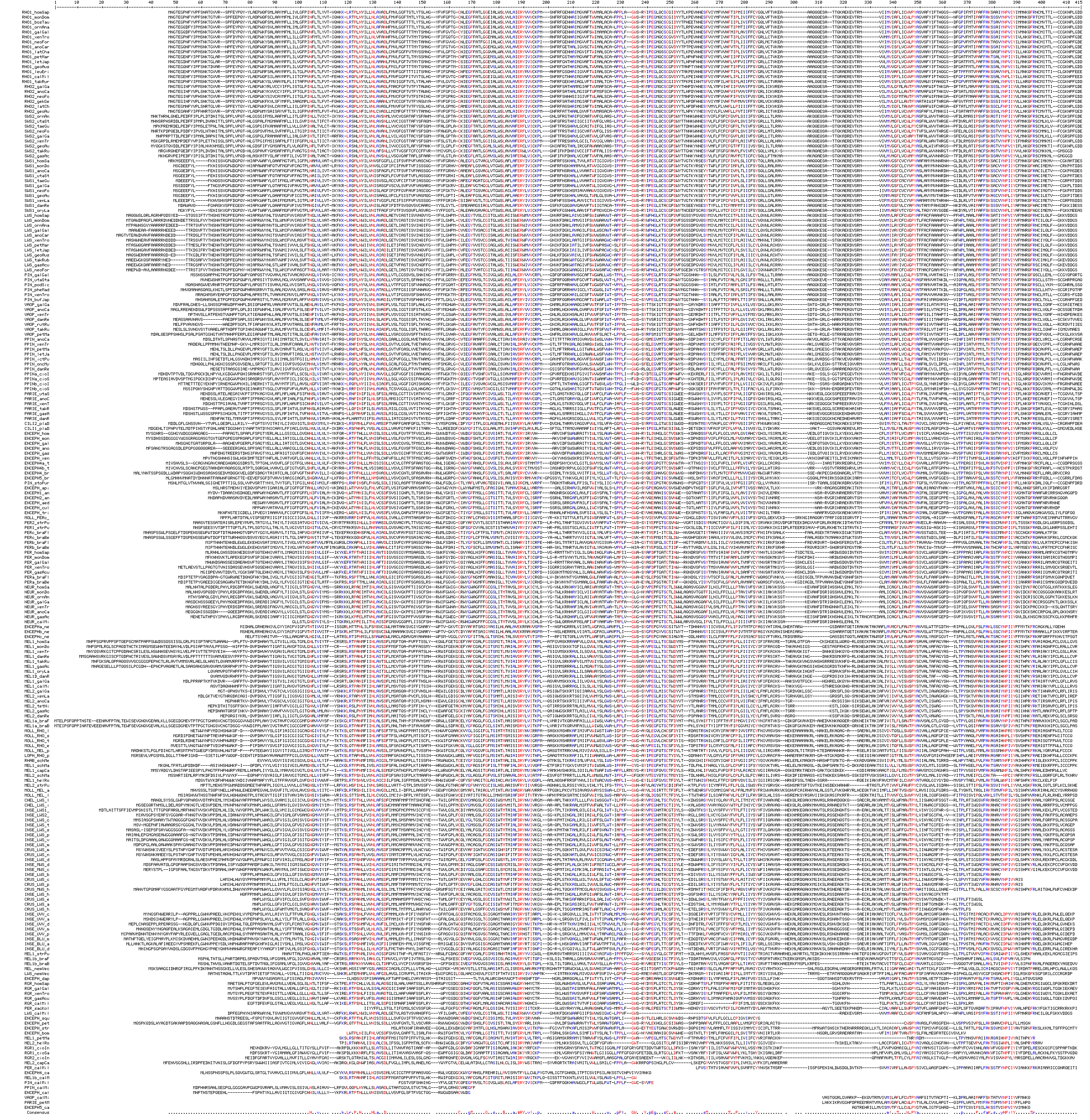Opsin evolution: alignment: Difference between revisions
Tomemerald (talk | contribs) No edit summary |
Tomemerald (talk | contribs) No edit summary |
||
| Line 1: | Line 1: | ||
This shows an alignment of | This shows an alignment of 147 opsins, almost all of ciliary type. Unalignable termini have been trimmed. Fragmentary sequences are mostly not shown: these score low and so fall to the bottom. That can still be useful as two important clades, jawless fish and chondrichthyes, are largely represented by fragments. Notice the numerous invariant (blue) and nearly invariant sequences (red) -- these anchor the alignment with near-certainty. Some of these are not specific to opsins but rather are properties of GPCR signalling proteins generally. | ||
Opsins have seven alpha helical sections traversing the cell membrane with the intervening sequence alternating as cytoplasmic and extra-cellular. Certain key residues such as the lysine where the retinal is covalently bound, counterions, and recognition sites diagnostic for binding of other proteins require markups that will be added shortly. | |||
Among other things, the alignment by [http://bioinfo.genopole-toulouse.prd.fr/multalin/multalin.html MultAlign] shows that the opsin classifier has properly named the opsins -- each classifies as expected from its name. Deletions and insertions show up clearly on the alignment, readily resolved as to type using the phylogenetic ordering to establish ancestral conditon. The alignment also exhibits some anomalies where the sequence in question needs re-evaluation back at the primary data source (cDNA and/or genome). | |||
MultAlign is apparently the only alignment software that allows line width to be specified. That's important here because it enables the entire alignment (147 sequences x 413 residues) to be seen in a single window. The numbering schemes allows specific residues and regions to be discussed. Colored text output was also an option but the file again is huge with color markups and awkward to display tightly within genomeWiki. | |||
[[Image:Opsin align.png|left]] | |||
[[Image:Opsin align.png]] | |||
[[Category:Comparative Genomics]] | [[Category:Comparative Genomics]] | ||
Revision as of 18:10, 21 November 2007
This shows an alignment of 147 opsins, almost all of ciliary type. Unalignable termini have been trimmed. Fragmentary sequences are mostly not shown: these score low and so fall to the bottom. That can still be useful as two important clades, jawless fish and chondrichthyes, are largely represented by fragments. Notice the numerous invariant (blue) and nearly invariant sequences (red) -- these anchor the alignment with near-certainty. Some of these are not specific to opsins but rather are properties of GPCR signalling proteins generally.
Opsins have seven alpha helical sections traversing the cell membrane with the intervening sequence alternating as cytoplasmic and extra-cellular. Certain key residues such as the lysine where the retinal is covalently bound, counterions, and recognition sites diagnostic for binding of other proteins require markups that will be added shortly.
Among other things, the alignment by MultAlign shows that the opsin classifier has properly named the opsins -- each classifies as expected from its name. Deletions and insertions show up clearly on the alignment, readily resolved as to type using the phylogenetic ordering to establish ancestral conditon. The alignment also exhibits some anomalies where the sequence in question needs re-evaluation back at the primary data source (cDNA and/or genome).
MultAlign is apparently the only alignment software that allows line width to be specified. That's important here because it enables the entire alignment (147 sequences x 413 residues) to be seen in a single window. The numbering schemes allows specific residues and regions to be discussed. Colored text output was also an option but the file again is huge with color markups and awkward to display tightly within genomeWiki.
